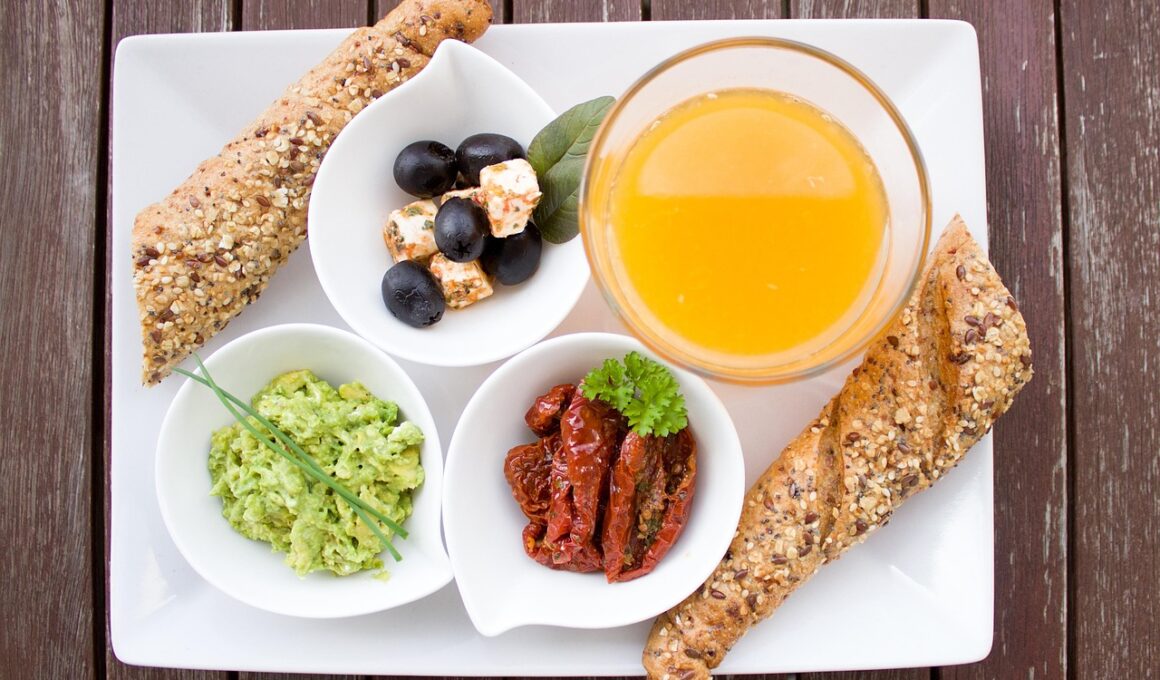The Role of Fiber and Whole Grains in Travel Nutrition for Athletes
When traveling, maintaining optimal nutrition is essential for athletes, especially during competitions or intense training. Incorporating fiber and whole grains in your diet can provide the necessary energy while promoting overall health. Fiber is crucial for digestive health, which becomes even more important when you’re on the go. Whole grains such as oats and brown rice not only provide complex carbohydrates but also contain vital vitamins and minerals. Including these foods can help athletes avoid gastrointestinal issues often caused by travel disruptions. When planning meals, consider options that are portable and easy to prepare. Snacks like whole grain energy bars or oatmeal packets can be a convenient source of nutrition. In addition to their health benefits, fiber-rich foods also help athletes maintain their weight by promoting a feeling of fullness. Relying on nutritious snacks can prevent those tempting but unhealthy travel food choices. Whether you’re on a long flight or a road trip, having fiber and whole grains readily available is key to sustaining performance levels. Opt for meals and snacks rich in these components to fuel your athletic pursuits sustainably.
Whole grains are an integral part of a balanced diet for athletes, providing energy and sustaining performance levels. Foods like quinoa, barley, and whole grain bread offer not just energy but also essential nutrients important for endurance sports. These grains are formulated with fiber, which helps regulate blood sugar levels during intense physical activities. For athletes, especially when traveling, meal planning is essential to ensure they have access to healthy options. Prepare your meals in advance, packing a variety of whole grains to mix and match. Including easy-to-carry items such as brown rice or whole grain pasta can provide meals high in carbohydrates, crucial for fueling workouts. Fiber-rich options can also support heart health, something athletes must prioritize. When you’re on the road or moving from one destination to another, consider packing snacks that incorporate whole grains, like homemade granola bars or whole grain crackers. These are not only filling but also provide sustained energy as they digest slowly. Thus, whole grains and fiber should serve as staples in an athlete’s travel nutrition plan along with hydration to maintain peak performance on the go.
Aside from energy, fiber plays a pivotal role in an athlete’s travel nutrition. This nutrient aids in digestion and helps to maintain steady blood sugar levels, crucial in preventing energy crashes. Traveling often disrupts typical eating habits, making it easy to opt for quick but unhealthy meals. Incorporate fiber-rich foods such as legumes, fruits, and vegetables. When packing for your journey, consider options that don’t spoil easily while still being high in fiber. Canned beans or dried fruits can be excellent on-the-go options packed with fiber that are easy to transport. Legumes like chickpeas can be added to salads or snacks, helping diversify your nutrition. They not only keep you full longer, but they are also versatile and easy to include in various meals. Furthermore, fiber helps regulate cholesterol levels, supporting heart health, which is vital for athletes in high-performance sports. It’s essential to find the right balance between whole grains and fiber during your travels. Staying mindful of your fiber intake will ensure your body remains healthy and your performance stays at its peak while you navigate your busy schedule.
Healthy Snack Options While Traveling
Healthy snacks are crucial for keeping energy levels high during travel. Athletic training often requires sustained energy, and snacks rich in fiber and whole grains can help meet those needs. Instead of typical travel snacks, opt for sustaining options that provide proper nutrition. Consider packing a variety of portable snacks like whole grain trail mixes, which blend nuts and dried fruits, offering protein and fiber. These snacks are energy-dense and can help satiate hunger without easily spoiling. Another smart choice is whole grain pita with hummus or nut butter; both options provide fiber and healthy fats that nourish you on the go. If you have a bit more time, preparing overnight oats with fruits can offer a fiber-filled breakfast option. These nutritious oats can be prepped at home and enjoyed while traveling without needing sophisticated refrigeration. Don’t forget fruit like bananas or apples, which pair well with nut butter and provide additional fiber. Always plan ahead to ensure your travel routine includes these healthy snacks so that you feel your best while competing or training.
Hydration also plays a critical role in ensuring athletes stay fit while traveling. It complements fiber and whole grains in maintaining optimal performance levels. Dehydration can impair digestion and hydration, especially when consuming high-fiber foods. Therefore, it becomes essential to drink plenty of water when increasing fiber intake to avoid digestive distress. Also, hydration assists in nutrient absorption, making it vital when consuming complex carbohydrates found in whole grains. Carry a reusable water bottle to encourage continuous hydration throughout your journey. Include electrolyte-rich beverages to replenish lost minerals, especially during long trips or intense training sessions. Smoothies made with leafy greens and whole fruits can be an excellent option for boosting both water intake and nutrient consumption. These blends not only hydrate but add fiber and essential nutrients that keep energy levels stable. Remember that a healthy balance between hydration and nutrition is vital for athletes. Preparing ahead with a focus on both these aspects allows athletes to perform at their best while traveling.
Travel nutrition doesn’t have to be overly complicated. With the right meal planning, athletes can effectively incorporate whole grains and fiber, leading to better health outcomes. Emphasizing these food groups can lead to increases in strength and endurance during physical activity. Consider using travel-friendly meal prep containers for portioning out snacks effectively. Easy to transport and fit into luggage, these containers can store anything from whole grain salads to veggies. Being mindful of food safety is critical as well; always keep perishables in insulated bags or ice packs. Prioritize foods that combine both fiber and whole grains, like barley-based salads or quinoa bowls topped with beans and vegetables. Diversifying the types of grains and fibers consumed can lead to a broader nutrient intake. Familiarizing yourself with local cuisines also opens avenues for healthy eating while traveling, as many cultures feature whole grains prominently. Always check menus for healthier options that align with your nutritional goals. By staying prepared and making conscious choices, athletes can easily maintain their nutrition while enjoying travel experiences.
Concluding Thoughts
In conclusion, athletes can significantly improve their travel nutrition by prioritizing fiber and whole grains. Careful planning and preparation can allow for better dietary options while on the road. These nutritious choices provide essential vitamins and minerals while offering sustained energy essential for optimal performance. Adequate fiber intake leads to improved digestion and overall health when traveling. Remember to incorporate snacks like whole grain crackers, high-fiber fruits, and nutritious grains into your diet. For athletes, fuel management becomes crucial, so make sure to include balanced foods. Experiment with different meals and snacks while incorporating high-fiber options. Incorporating different recipes and combinations can enhance the experience while traveling. Communication with local vendors or restaurants can yield new dietary inspirations while ensuring you maintain your nutrition regime. The role of fiber and whole grains can make a substantial difference in an athlete’s well-being during travel. Establish a routine that emphasizes these foods, consider nutrition a priority, and your performance will flourish while embracing new travel adventures.
Traveling can disrupt an athlete’s normal eating routine, making it easy to fall back on unhealthy snacks. Balancing convenience with nutrition is vital. Understanding how fiber-rich foods can stabilize energy levels assists athletes in making healthier choices. They help combat the fatigue often faced during travel. Brainstorming meal plans can assist in avoiding the temptation of quick, unhealthy options. Focus on fiber and whole grains, considering options that nourish and energize. Snack ideas such as roasted chickpeas, which are packed with protein and fiber, can be a game changer for long travel days. They require no refrigeration and are incredibly satisfying. Overall, being strategic about food choices while traveling improves physical endurance and recovery significantly. The impact of nutritious foods can enhance performance and support a healthy lifestyle, even on the go. Staying aware of the benefits of fiber and whole grains leads to sustainable nutrition strategies during travels. Thus, prioritizing the right foods can empower athletes to thrive, making their travel experiences enjoyable while accomplishing fitness goals simultaneously.


